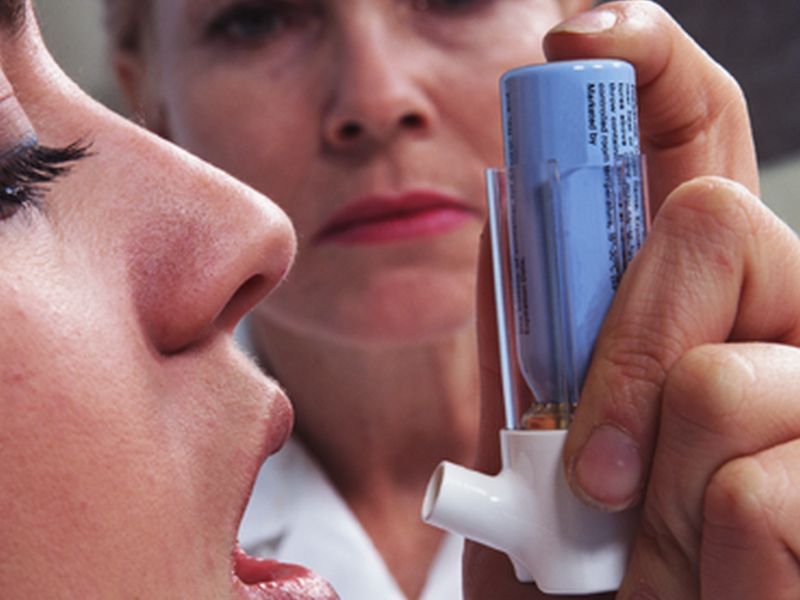Coronavirus Infects Eyes as Well as Lungs
COVID-19 is primarily a respiratory infection, but experts have suspected the virus can also infiltrate the eyes. Now, scientists have more direct evidence of it.
The findings are based on a patient in China who developed an acute glaucoma attack soon after recovering from COVID-19. Her doctors had to perform surgery to treat the condition, and tests of her eye tissue showed evidence of SARS-CoV-2.
The case offers proof that "SARS-CoV-2 can also infect ocular tissues in addition to the respiratory system," the doctors reported in the Oct. 8 online edition of the journal JAMA Ophthalmology.
"It's been suspected that the eyes can be a source of both 'in' and 'out'" for the novel coronavirus, said Dr. Aaron Glatt, a spokesman for the Infectious Diseases Society of America.
That's why health care workers protect their eyes with goggles or face shields, he noted.
It's not possible to say whether the patient in this case contracted SARS-CoV-2 via her eyes, according to Glatt. But that is a possibility -- whether through viral particles in the air or by touching her eyes with a virus-contaminated hand, he said.
Another big unknown is whether any lingering virus in patients' eye tissue will cause problems.
According to Dr. Grace Richter, an ophthalmologist at the University of Southern California's Roski Eye Institute in Los Angeles, "It's too early to know what having this virus floating around in the eye means for ocular health."
At this point, Richter said, limited eye problems have been seen with COVID-19: A small number of patients develop conjunctivitis ("pink eye"), where the white part of the eye and inside of the eyelid become swollen, red and itchy.
The patient in this case suffered acute angle-closure glaucoma -- a serious condition in which pressure in the eyes suddenly rises due to fluid buildup. It requires prompt treatment to relieve the pressure, sometimes with surgery to restore the eye's normal fluid movement.
Richter was doubtful the coronavirus directly caused the eye complication. In general, certain anatomical features of the eye make some people vulnerable to acute angle-closure glaucoma, and it can be triggered by medications, she explained.
Richter speculated that since the patient was hospitalized and likely received various drugs, that might have been the cause.
That is possible, agreed Dr. Sonal Tuli, a clinical spokeswoman for the American Academy of Ophthalmology and chairwoman of ophthalmology at the University of Florida College of Medicine, in Gainesville.
Tuli said the patient's case is "interesting," but leaves open a number of questions. One is whether the virus present in the eye tissue is actually infectious.
The patient was a 64-year-old woman who was hospitalized for COVID-19 on Jan. 31. Eighteen days later, her symptoms had fully resolved, and throat swabs turned up negative for SARS-CoV-2.
About a week later, though, she developed pain and vision loss in one eye, and then in her other eye a few days afterward, according to the report by Dr. Ying Yan and colleagues at the General Hospital of the Central Theater Command in Wuhan, China.
The patient landed in the hospital again, where she was diagnosed with acute angle-closure glaucoma and cataract. Medication failed to bring down her eye pressure, so her doctors performed surgery -- taking tissue samples in the process.
Tests of those samples turned up evidence that SARS-CoV-2 had invaded the eye tissues, Yan's team reported.
While it's not clear how the virus got into the patient's eyes, the experts agreed the case underscores the importance of eye protection. For health care providers, that means goggles and face shields; for the average person, it's regular hand-washing and keeping the hands away from the eyes.
"I think people don't realize how often they touch their eyes," Tuli said.
That advice will reduce the chance of any virus, including cold and flu bugs, from coming into contact with the eyes, she noted.
While that may be enough in most cases, people caring for someone with COVID-19 at home may want to be extra cautious, Tuli suggested. Wearing eye protection in addition to a mask is a "good idea," she said. (By Amy Norton, HealthDay Reporter)
Source: https://www.medicinenet.com/script/main/art.asp?articlekey=247625






